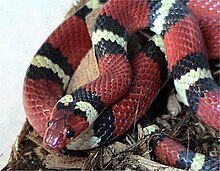Kingsnake
Kingsnakes are colubrid snakes. They are members of the genus Lampropeltis, which include milk snakes and four other species. There are many subspecies, and experts differ on their classification. These snakes are mostly found in North America and Central America.
| Kingsnakes Temporal range: [1]
| |
|---|---|

| |
| Scarlet kingsnake (Lampropeltis elapsoides) | |
| Scientific classification | |
| Domain: | Eukaryota |
| Kingdom: | Animalia |
| Phylum: | Chordata |
| Class: | Reptilia |
| Order: | Squamata |
| Suborder: | Serpentes |
| Family: | Colubridae |
| Tribe: | Lampropeltini |
| Genus: | Lampropeltis Fitzinger, 1843 |
| Synonyms | |
|
Ablabes, Anguis, Bellophis, Calamaria, Coronella, Herpetodryas, Natrix, Ophibolus, Osceola, Phibolus, Pseudelaps, Zacholus[2] | |
They use constriction to kill their prey. They prey on other snakes, including venomous snakes. They are immune to the venom. They also eat lizards, rodents, birds, and eggs.[3]
They have red, black, and white or cream bands, creating a striking appearance. [4]Their colouration is an example of Batesian mimicry, because it is very similar to venomous coral snakes living in the same areas. This gives the kingsnakes protection from the birds which prey on them.[5] Their length is usually about 3 to 4 feet.[6]
References
changeMedia related to Lampropeltis at Wikimedia Commons
- ↑ "Fossilworks: Lampropeltis". Archived from the original on 2018-12-02. Retrieved 2020-01-07.
- ↑ Wright A.H. and A.A. Wright. 1957. Handbook of Snakes of the United States and Canada. Comstock. Ithaca and London. 1,105 pp. (in 2 volumes) (Genus Lampropeltis, p. 330.)
- ↑ Conant R. 1975. A field guide to reptiles and amphibians of Eastern and Central North America. 2nd ed, Boston: Houghton Mifflin, genus Lampropeltis, p. 201. ISBN 0-395-19977-8
- ↑ curie, Marie (2024-08-07). "100 Most Popular Non-Venomous snakes in the world(With Pictures)". SNAKES WORLD. Archived from the original on 2024-08-06. Retrieved 2024-08-23.
- ↑ Kikuchi, David W. & Pfennig, David W. 2010. Predator cognition permits imperfect coral snake mimicry. The American Naturalist. 176 (6): 830–834. [1]
- ↑ "Most famous Non-venomous snakes in theworld". snakes world. Archived from the original on 2024-08-06. Retrieved 2024-08-23.